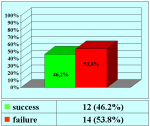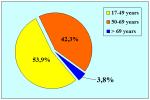The surgical technique of “Urethrotomy” creates a widening of the urethra using a special instrument. The operation is performed endoscopically through the external urinary meatus, progressing up to the area that narrows, without invasive surgery. There are two basic types of Urethrotomy:
- Internal urethrotomy by cold knife (Sachse’s technique). In this procedure, the narrow part of the urethra is incised, cutting the stricture at 12 o’clock, with a cold knife (figures 1,2), thus without cauterizing or using any other form of energy. The internal urethrotomy by cold knife is mainly used in patients with bulbar urethral strictures.
- Holmium laser urethrotomy. In this procedure, the narrow part of the urethra is incised, cutting the stricture at 12 o’clock, using a holmium laser fiber (figures 3,4). The Holmium laser urethrotomy is mainly used in patients with posterior urethral strictures, or in patients with bladder neck contracture after prostatic surgery.
With these procedures, an endoscopic approach is used to open the urethra, in an outpatient service, day surgery or with a two-day hospital stay.
Urethrotomy is generally suggested in the following cases:
- patients with bladder neck contracture after prostatic surgery.
- patients with simple and short bulbar urethral strictures who had no previous treatment.
- patients who refuse the standard surgical approach or who prefer to delayed surgery.
- elderly patients with urethral strictures associated with poor general health conditions where lengthy anaesthesia to perform complex urethral repair is not recommended.
|
Figure 1 |
Figure 2 |
Figure 3 |
Figure 4 |
1. Question: What kind of anesthesia is used for this surgery?
Answer: General anesthesia without oro-tracheal intubation.
2. Question: How many hours does the surgery take?
Answer: About 1/2 hour.
3. Question: Are there any risks concerning erection, fertility and continence after the surgery?
Answer: No.
4. Question: How many days of hospital recovery are expected following the surgery?
Answer: In general, from 1 to 2 days.
5. Question: How long will I have to use a urethral catheter following surgery?
Answer: The urethral catheter must stay in place for two week following surgery.
6. Question: Are there any particular recommendations during convalescence?
Answer: During convalescence, antibiotic use is suggested until the catheter is removed. It is also suggested that long car trips be avoided, as well as heavy labor, sexual activity and sports.
7. Question: When will I be able to resume work, sexual activity and sports?
Answer: All these activities can be gradually resumed after the removal of the catheter.
8. Question: Can I ride a bike or a motorcycle immediately after the surgery?
Answer: It is not recommended to ride bikes, motorcycles or horses after the surgery.
9. Question: What kinds of foods and drinks should be avoided after the surgery?
Answer: Beer and sparkling wines should be avoided, as well as large quantities of chocolate, cocoa, nuts and shellfish.
Answer: General anesthesia without oro-tracheal intubation.
2. Question: How many hours does the surgery take?
Answer: About 1/2 hour.
3. Question: Are there any risks concerning erection, fertility and continence after the surgery?
Answer: No.
4. Question: How many days of hospital recovery are expected following the surgery?
Answer: In general, from 1 to 2 days.
5. Question: How long will I have to use a urethral catheter following surgery?
Answer: The urethral catheter must stay in place for two week following surgery.
6. Question: Are there any particular recommendations during convalescence?
Answer: During convalescence, antibiotic use is suggested until the catheter is removed. It is also suggested that long car trips be avoided, as well as heavy labor, sexual activity and sports.
7. Question: When will I be able to resume work, sexual activity and sports?
Answer: All these activities can be gradually resumed after the removal of the catheter.
8. Question: Can I ride a bike or a motorcycle immediately after the surgery?
Answer: It is not recommended to ride bikes, motorcycles or horses after the surgery.
9. Question: What kinds of foods and drinks should be avoided after the surgery?
Answer: Beer and sparkling wines should be avoided, as well as large quantities of chocolate, cocoa, nuts and shellfish.
| Up-to-date to 12-31-2021 | |||

PDF Summarizing table |
|||









